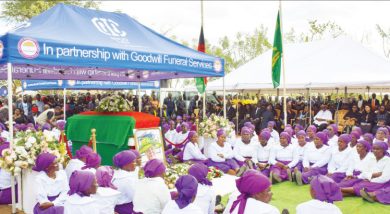Council capacity gaps compromise projects
Ministry of Local Government, Unity and Culture says capacity gaps in the country’s 35 local authorities (LAs) are compromising implementation of development projects and leading to delivery of substandard works.
Officials from the ministry, led by Principal Secretary Esmie Kainja, said this on Monday when they appeared before the Public Accounts Committee (PAC) of Parliament in Lilongwe to respond to audit queries.
During the meeting, committee vice-chairperson Ned Poya pointed out that lack of capacity in councils was affecting infrastructure initiatives, yet, they handle huge financing windows for development projects.

He said: “Constituency Development Fund [CDF] alone is bringing to our councils around K39 billion. But the people handling this money are not capacitated as councils do not have engineers, quantity surveyors, qualified accountants and procurement officers.
“But these people are expected to handle huge sums of money, and how are we balancing the two? We have finances like Governance to Enable Service Delivery [Gesd], District Development Fund [DDF] and others, but the people handling this money lack capacity.”
Responding to the query, the ministry’s deputy director of planning and policy Flemmings Nyirenda said they have challenges in terms of numbers of staff and skills in councils.
He said the ministry has supported LAs to come up with a functional review, as the number of available establishments was very old and not responding to new developments.
Said Nyirenda: “We have also worked with other partners in councils of M’mbelwa, Mchinji, Lilongwe, Mangochi and Ntcheu where they have recruited a number of engineers who are on new establishments.
“This has assisted us because at the expiry of the projects, they will be absorbed by councils and that will capacitate the directorate of public works. We have trained directors of public works [DPWs] in terms of project management, auto-card, to enable them design projects.”
He said the ministry was also working with the Ministry of Transport and Public Infrastructure and National Construction Industry Council (NCIC) to capacitate DPWs on project identification, supervision, and management.
Said Nyirenda: “We still have gaps on quantity surveyors and architects. We don’t have qualified engineers, but at least we have staffs that have qualifications of an engineer, and this is a bit that we need to work on.
“We have put this as a requirement in the LA performance assessment as one way of motivating engineers. The key challenge is that most engineers do not want to work in LAs, they are not able to attract the staff that is required.”
Chipping in, Kainja said the biggest thorn was limited funding and delayed disbursement. She said projects implemented last year were less than what was planned.
On decentralisation, she said the ministry was in the last phase of the devolution, where “we are dealing with the last five MDAs so that councils are fully functional”.
Malawi Local Government Association executive director Hadrod Mkandawire said the gaps are due to lack of attractive conditions of service in the LAs.
He said: “If we were fully devolved where LAs are treated as development actors in their own right with the requisite financial capacity, they would be in a strategic position to attract, employ and retain any cadre of staff, including engineers.
“However, the observation of some compromised quality infrastructure in some LAs occasioned by capacity gaps as a result of absence of qualified personnel is also a correct one.”
But despite the challenges, Mkandawire said the LAs are leveraging the available capacity to deliver quality development infrastructure.
Meanwhile, NCIC spokesperson Lyford Gideon has said they are implementing capacity building interventions to achieve quality in the construction industry.
These include foremanship programme, certificate in construction management delivered in collaboration with Soche, Lilongwe and Mzuzu technical colleges and diploma in construction management at Malawi University of Business and Applied Sciences.
By last year, the councils had an overall vacancy rate of 38 percent.
Capacity gaps have been a perennial problem in councils despite handling increased allocations courtesy of decentralisation.





